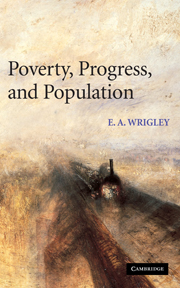Book contents
- Frontmatter
- Contents
- List of figures
- List of tables
- Acknowledgements
- Introduction
- PART I The wellsprings of growth
- PART II Town and country
- 9 City and country in the past: a sharp divide or a continuum?
- 10 ‘The great commerce of every civilized society’: urban growth in early modern Europe
- 11 Country and town: the primary, secondary, and tertiary peopling of England in the early modern period
- PART III The numbers game
- Bibliography
- Index
9 - City and country in the past: a sharp divide or a continuum?
Published online by Cambridge University Press: 23 December 2009
- Frontmatter
- Contents
- List of figures
- List of tables
- Acknowledgements
- Introduction
- PART I The wellsprings of growth
- PART II Town and country
- 9 City and country in the past: a sharp divide or a continuum?
- 10 ‘The great commerce of every civilized society’: urban growth in early modern Europe
- 11 Country and town: the primary, secondary, and tertiary peopling of England in the early modern period
- PART III The numbers game
- Bibliography
- Index
Summary
War, politics, and personality were the topics with which Plutarch was most at ease as a historian: he selected and embellished whichever account of past events best enabled him to exemplify some moral or political principle, but seldom departed from these basic themes. In his Parallel lives, however, when relating the deeds of Theseus, he permitted himself a brief digression about the creation of a city-state. Having described Theseus's return from Crete after overcoming the minotaur and the tragic suicide of his father Aegeus, deceived by his son's carelessness into thinking that Theseus was dead, Plutarch continues:
After Aegeus's death Theseus conceived a wonderful and far-reaching plan, which was nothing less than to concentrate the inhabitants of Attica into a capital. In this way he transformed them into one people belonging to one city, whereas until then they had lived in widely scattered communities, so that it was difficult to bring them together for the common interest, and indeed at times they had even quarrelled and fought one another.
We learn that:
He then proceeded to abolish the town halls, council chambers, and magistracies in the various districts. To replace them he built a single town hall and senate house for the whole community on the site of the present Acropolis, and he named the city Athens.
Plutarch's vignette was penned long ago but has a familiar ring.
- Type
- Chapter
- Information
- Poverty, Progress, and Population , pp. 251 - 267Publisher: Cambridge University PressPrint publication year: 2004



